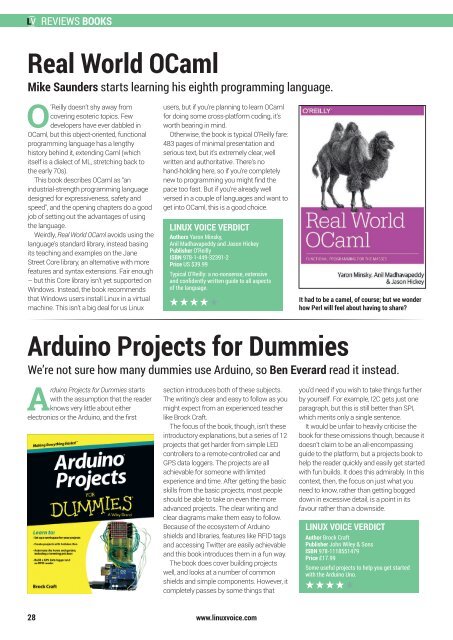Linux-Voice-Issue-001
Linux-Voice-Issue-001
Linux-Voice-Issue-001
You also want an ePaper? Increase the reach of your titles
YUMPU automatically turns print PDFs into web optimized ePapers that Google loves.
REVIEWS BOOKS<br />
Real World OCaml<br />
Mike Saunders starts learning his eighth programming language.<br />
O’Reilly doesn’t shy away from<br />
covering esoteric topics. Few<br />
developers have ever dabbled in<br />
OCaml, but this object-oriented, functional<br />
programming language has a lengthy<br />
history behind it, extending Caml (which<br />
itself is a dialect of ML, stretching back to<br />
the early 70s).<br />
This book describes OCaml as “an<br />
industrial-strength programming language<br />
designed for expressiveness, safety and<br />
speed”, and the opening chapters do a good<br />
job of setting out the advantages of using<br />
the language.<br />
Weirdly, Real World OCaml avoids using the<br />
language’s standard library, instead basing<br />
its teaching and examples on the Jane<br />
Street Core library, an alternative with more<br />
features and syntax extensions. Fair enough<br />
– but this Core library isn’t yet supported on<br />
Windows. Instead, the book recommends<br />
that Windows users install <strong>Linux</strong> in a virtual<br />
machine. This isn’t a big deal for us <strong>Linux</strong><br />
users, but if you’re planning to learn OCaml<br />
for doing some cross-platform coding, it’s<br />
worth bearing in mind.<br />
Otherwise, the book is typical O’Reilly fare:<br />
483 pages of minimal presentation and<br />
serious text, but it’s extremely clear, well<br />
written and authoritative. There’s no<br />
hand-holding here, so if you’re completely<br />
new to programming you might find the<br />
pace too fast. But if you’re already well<br />
versed in a couple of languages and want to<br />
get into OCaml, this is a good choice.<br />
LINUX VOICE VERDICT<br />
Authors Yaron Minsky,<br />
Anil Madhavapeddy and Jason Hickey<br />
Publisher O’Reilly<br />
ISBN 978-1-449-32391-2<br />
Price US $39.99<br />
Typical O’Reilly: a no-nonsense, extensive<br />
and confidently written guide to all aspects<br />
of the language.<br />
It had to be a camel, of course; but we wonder<br />
how Perl will feel about having to share?<br />
Arduino Projects for Dummies<br />
We’re not sure how many dummies use Arduino, so Ben Everard read it instead.<br />
Arduino Projects for Dummies starts<br />
with the assumption that the reader<br />
knows very little about either<br />
electronics or the Arduino, and the first<br />
section introduces both of these subjects.<br />
The writing’s clear and easy to follow as you<br />
might expect from an experienced teacher<br />
like Brock Craft.<br />
The focus of the book, though, isn’t these<br />
introductory explanations, but a series of 12<br />
projects that get harder from simple LED<br />
controllers to a remote-controlled car and<br />
GPS data loggers. The projects are all<br />
achievable for someone with limited<br />
experience and time. After getting the basic<br />
skills from the basic projects, most people<br />
should be able to take on even the more<br />
advanced projects. The clear writing and<br />
clear diagrams make them easy to follow.<br />
Because of the ecosystem of Arduino<br />
shields and libraries, features like RFID tags<br />
and accessing Twitter are easily achievable<br />
and this book introduces them in a fun way.<br />
The book does cover building projects<br />
well, and looks at a number of common<br />
shields and simple components. However, it<br />
completely passes by some things that<br />
you’d need if you wish to take things further<br />
by yourself. For example, I2C gets just one<br />
paragraph, but this is still better than SPI,<br />
which merits only a single sentence.<br />
It would be unfair to heavily criticise the<br />
book for these omissions though, because it<br />
doesn’t claim to be an all-encompassing<br />
guide to the platform, but a projects book to<br />
help the reader quickly and easily get started<br />
with fun builds. It does this admirably. In this<br />
context, then, the focus on just what you<br />
need to know, rather than getting bogged<br />
down in excessive detail, is a point in its<br />
favour rather than a downside.<br />
LINUX VOICE VERDICT<br />
Author Brock Craft<br />
Publisher John Wiley & Sons<br />
ISBN 978-1118551479<br />
Price £17.99<br />
Some useful projects to help you get started<br />
with the Arduino Uno.<br />
28<br />
www.linuxvoice.com


